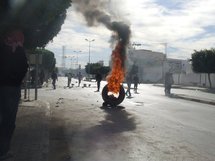Tunisia deploys troops in capital as new clashes erupt
AFP
TUNIS- Tunisia deployed troops in the capital and imposed a dusk-to-dawn curfew Wednesday as weeks of violent protests reached the city and new clashes erupted further south with three reported killed.
Under pressure after security forces opened fire on demonstrators over the weekend, killing between 20 and 50 people, the government fired the interior minister and said it would investigate alleged use of excessive force.

Soldiers guarded the entrance to the Ettadhamen quarter where rioters burnt vehicles and attacked government offices late Tuesday.
The presence of the army on the streets failed to prevent fresh violence in the centre on Wednesday as security forces fired tear gas to disperse hundreds of demonstrators, an AFP reporter said.
The interior ministry ordered a curfew from 8:00 pm (1900 GMT) Wednesday to 5:30 am Thursday, citing "disturbances, pillaging and attacks against people and property which have occurred in some districts of the city".
Prime Minister Mohamed Ghannouchi announced the dismissal of Interior Minister Rafik Belhaj Kacem, the minister in charge of the police, whose brutal crackdown of the demonstrations has attracted international condemnation.
The European Union condemned the "disproportionate" use of force by police while the UN human rights chief called for an independent probe into the deadly violence.
In Washington, State Department spokesman Philip Crowley told reporters that "the United States is deeply concerned about the violence" and urged "restraint as citizens exercise their right of non-violent public assembly."
Canadian Foreign Minister Lawrence Cannon also said Ottowa was "concerned by reports of violence during public rallies" and "urges the Tunisian authorities to restrain their security forces."
Labour activists said security forces killed more than 50 people in three days from Saturday in demonstrations in the western Kasserine region.
The government says that 21 people were killed. It admitted that police opened fire on demonstrators, but said they had acted only in self-defence.
"Whatever the precise total, I am extremely concerned about the very high number of people killed in Tunisia in recent weeks," UN High Commissioner for Human Rights Navi Pillay said in a statement.
"It is imperative that the government launch a transparent, credible and independent investigation into the violence and killings," she said.
"If there is evidence that members of the security forces have used excessive force, or conducted extra-judicial killings, they must be arrested, tried and -- if found guilty of offences -- punished according to the law."
The prime minister said a commission would investigate alleged excesses by the security forces, and another would look into allegations of corruption by opposition and non-governmental groups.
He also announced the release of all those arrested in the unrest, "with the exception of those involved in acts of vandalism," although he gave no figures.
Soldiers deployed in Tunis were there "solely to protect public institutions against acts of vandalism and looting," he said.
The violence spread south Wednesday with new clashes in the towns of Douz, Thala and Sfax.
A witness told AFP that police opened fire on protesters in Douz, 550 kilometres (340 miles) from the capital, killing two people.
Police first used tear gas to disperse the crowd "before opening fire with real bullets," said the witness, a former union activist, speaking on condition of anonymity.
"Between four and five other residents are wounded, some of them seriously," he said.
He later said that security forces had left the town and that protesters set public buildings on fire.
A demonstrator was also shot dead and two others wounded in gunfire in the central-western town of Thala, about 250 kilometres southwest of the capital, a unionist said, after police fired on a protest.
"A young protester, Wajdi Saihi, 26, was killed by police fire and two others were wounded," union activist Belgacem Saihi said.
He said police had opened fire and used tear gas to disperse a "peaceful" rally in Thala.
Five protesters suffered gunshot wounds in the southern economic centre of Sfax, union activists said, after riot police moved in to disperse thousands who had taken to the streets for a general strike in the industrial city 300 kilometres southeast of Tunis.
Police on Wednesday also detained a Communist party leader, his wife said, making him the first politician arrested since the unrest began.
Hamma Hammami, the leader of the Tunisian Workers' Communist Party (POCT), which is banned by the government, was arrested at his home near Tunis, Radia Nasraoui told AFP.
The 59-year-old had repeatedly denounced President Zine El Abidine Ben Ali's government to several foreign media and told Italian weekly Left that the protests could lead to the government's fall.
--------------------------------------------------------------------------------------